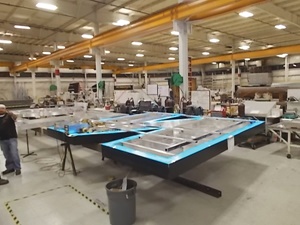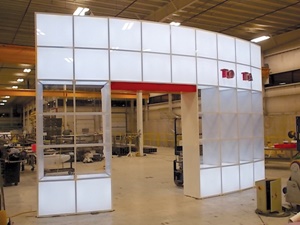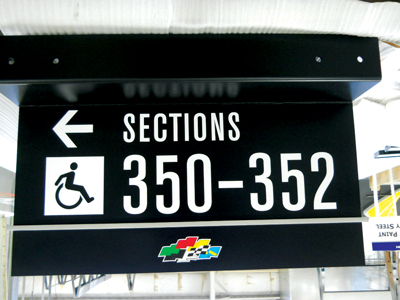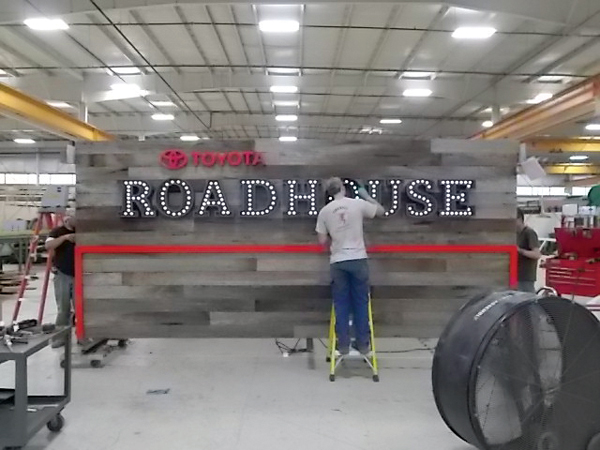 |
Inside Jones Sign Co.’s Green Bay production facility, employees work on display details down to the letter.
All photos by: JONES SIGN CO.
|
Green Bay’s Jones Sign Co. has done sign work for historic venues such as Lambeau Field, Daytona International Speedway, Dodger Stadium and Churchill Downs.
Yet the 106-year-old firm flies largely under the radar despite its strong reputation as a designer, manufacturer and installer of sports signs, whether it’s “Big Hoss,” the massive video board at Texas Motor Speedway, or the Culver’s Frozen Custard suite sign at the University of Wisconsin’s Camp Randall Stadium.
Part of the lack of brand recognition is because Jones Sign doesn’t produce the electronic modules that make up the guts of the huge LED video boards drawing attention at sports facilities. Daktronics, Panasonic and Mitsubishi Electric make most of the headlines in that respect. But Jones Sign does pretty much everything else, including buying the modules from those other firms for installing the trendy monster boards, which is part of its turnkey solution for clients.
For Jones Sign Co., depending on the client’s needs, it’s less expensive to buy the modules from others than entering a highly competitive space and building modules itself, and that’s why it has stayed clear of that piece of the business, said Todd Patrickus, Jones Sign’s executive vice president.
All told, the company has made signs for more than 15 sports projects, including six arenas and three minor league ballparks.
At Daytona, as part of the track’s $400 million renovation, Jones Sign’s $12.5 million contract covered the production and installation of more than 3,000 signs, including the modules (supplied by Panasonic) for two LED screens tied to Toyota and Florida Hospital sponsorship zones.
The speedway work extended to the 30-foot-high Space Shuttle Endeavour wall sign as part of Toyota’s injector space on the track’s third level. Because the facility lies in a hurricane zone, the outdoor wall and the sign attached to it had to be engineered to withstand gale-force winds. The entire wall was built in sections in Green Bay before semitractor-trailer trucks hauled it to Daytona Beach. From there, the sections were lifted by crane and welded to the building. The same process took place for Daytona’s 350-foot-long marquee attached to the building’s exterior, Patrickus said.
“We did everything from the men’s and women’s restroom signs to the 14-foot-tall letters for the Daytona marquee,” Patrickus said. “Not many sign companies do installation. A lot of them subcontract that piece. I think that was attractive to ISC.”
Key executives
■ John Mortensen, president
■ Todd Patrickus, executive vice president
■ Tom Cummings, vice president of special projects
■ Al Mikula, chief operating officer
■ Sara Ledvina, vice president of sales and project management
Key sports clients:
Green Bay Packers, Daytona International Speedway, Churchill Downs, Los Angeles Dodgers, University of Wisconsin, Texas Motor Speedway
Jones Sign’s business model was key to the company getting track owner ISC’s business, said track President Joie Chitwood, who made multiple trips to Green Bay to consult on the design of the marquee, among other Daytona sign projects.
“As we built the world’s first true motorsports stadium, we wanted to make sure guests, no matter where they were on property, had signs that were clearly visible and helped them navigate our wider concourses,” Chitwood said. “Jones Sign accomplished those goals and produced signs that matched the scope and scale of the project.”
Jones Sign Co. got its start in sports doing sign work for the Green Bay Packers at the team’s inception in 1919, nine years after the Jones family founded the business. At that time, the company’s original shop was within sight of the Packers’ first home at East High School in town.
Lambeau Field opened in 1957, and the two parties have kept their working relationship intact over the past 60 years at a stadium that’s about a two-minute drive from Jones Sign’s current 213,000-square-foot manufacturing facility. Four years ago, in 2012, the company built the structures holding Mitsubishi Electric video boards in both end zones at Lambeau. The project came four years after it signed a marketing deal with the Packers to become the team’s official sign company. The agreement gave Jones Sign a major boost and led to other sports work, Patrickus said.
Most of the firm’s executives are Green Bay-area natives, and they have seen the company grow in tandem with the Packers’ brand in the NFL’s smallest market.
“My first job was painting the Packer schedule on the back of the scoreboard in the north end zone [in 1977], as you could read it from the street,” said John Mortensen, Jones Sign’s owner and president. “Jones had been doing that as long as the [old] scoreboard was there.”
Mortensen bought the company from the Joneses in 1982. Patrickus joined the company in 1996, when annual revenue ran roughly $3 million. Twenty years later, revenue has jumped to $70 million annually, in part because of the second-generation building boom going on across sports. In addition to arenas and stadiums, Jones Sign produces signs for retail outlets such as AutoZone and Dollar Tree, plus hospitals and malls.
Outside of Green Bay, there are factories in Juarez and Tijuana, Mexico, and offices in Chicago, Philadelphia, San Diego and Tampa. Its sales staff of 20 pursues leads and meets with project owners, architects and builders to earn business. Much of its sports work involves going through a bid process.
Its services include speciality fabrication, which came in handy at T-Mobile Arena, the new $375 million arena in Las
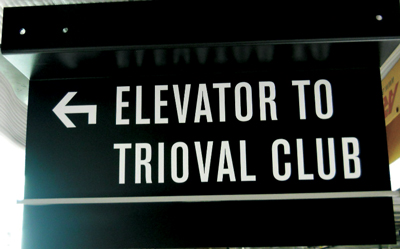 |
Deals with sports facilities like Daytona International Speedway often include signage from top to bottom, including not just scoreboards and displays but also section and directional signage.
|
Vegas opening in April. As part of the lobby inside the main entrance, Jones Sign has customized sponsorship signs for a large curved media wall, which runs 22 feet high and 180 feet long, and stands out as the centerpiece of that space. The fabrication work — the cutting, bending and assembling of metal panels — is one of three jobs Jones Sign was hired to complete for the arena’s interior and exterior spaces.
Elsewhere, Jones Sign is producing all of the directional signs inside and outside of Golden 1 Center, the Sacramento Kings’ new $477 million arena opening in October. Technology plays a key role for both arenas, and in general it has reshaped Jones Sign’s business over the past decade as more teams and facilities move toward LED boards. At one time, all three of its manufacturing facilities did big business producing neon signs, but LED has killed that end of the lighted sign industry, other than a few repair jobs, Patrickus said.
Over the next few years, Jones Sign will pursue business for the new NFL stadium in Los Angeles. It’s close to reaching an agreement to produce signs and banners for the Rams’ three-year stay at Los Angeles Memorial Coliseum, but no deal has been signed, he said.
Elsewhere in town, Jones Sign has a $3 million contract to supply signs for Metropolis, a large mixed-use project in downtown Los Angeles, situated between Staples Center/L.A. Live and Grand Avenue’s arts district.
“Demand is huge and it’s not only in sports,” Patrickus said. “With all the baby boomers getting older, we’re getting a lot of work with hospital campuses going up.”



